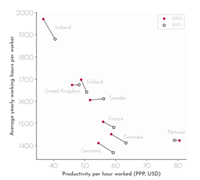Having the right technology and knowhow in place will give you the strongest commercial advantage from flexible working. Here are four examples of best practice which, in our experience, will deliver you the best results – right now:
1. Ensure your flexible working policy is clearly defined
This will make it a vital plank in your recruitment campaigns, helping you secure top talent in today’s highly competitive job market. Demonstrating to potential hires that your organisation is committed to flexible working is a powerfully persuasive differentiator for desirable candidates deliberating between you or your competitors.
If your company does not already have a policy in place, the first challenge for your HR function is to implement one, defining its scope and shape, and confirming its legality. Once it is established, it must be clearly visible to all employees and regularly reviewed and updated. We have significant experience designing flexible working policies, so can help you with this process.
2. Support your people
In many organisations, managers are your first line of HR but they are often neglected when it comes to getting training to respond to widely varying flexible working questions employees may raise. Equip your managers by creating online courses for them, offering them face-to-face training or empowering your HR teams to (with literally the touch of a button) prompt managers that they need to get trained.
A Learning Management System (LMS) platform will do this for you by storing your courses, targeting and launching them at the right audience(s) and capturing training outcomes to measure and appreciate its success. If you are unsure how to create or manage this, our highly qualified consultants will be happy to help.
3. Define, manage and measure success
As with previous trials, Iceland’s clearly demonstrated that offering shorter hours doesn’t lead to decreased productivity. Often, the opposite is the case. Flexible working therefore can allow your organisation to redefine how you distinguish success, re-emphasising the importance of goal-setting, regular performance conversations and feedback. This will help your employees understand their role in achieving success and work towards the same business goals.
Using the right performance management and career development technology, track these conversations to ensure they equate to better business performance. For more details about the technology available right now to help you do this, contact us today.
4. Manage employees’ working patterns and time
The key to any successful flexible working process is understanding the working patterns and hours that your workforce has agreed to, quickly capturing and amending this data, and gathering necessary employee management information.
As an example: does your organisation have the tools to effectively manage employees and their time, including leave or holiday requirements linked to their contracts? If robust enough, your core HR tech solutions should do this for you, aligning organisational data closely to time management solutions. This will hugely reduce the manual burden on your HR teams, freeing them to focus instead on their departments’ strategic goals.
/How-future-global-working-patterns-are-impacting-your-people-720x360-(1).webp?mode=autocrop&w=320&h=320&attachmenthistoryguid=96cf4a90-f36c-4a65-8a25-cc8a4c16f537&v=&c=31c492ad1a0df06f013006fa452af725fb0fedc945a69365c4c98d2c1b7e3d0e)

/common_pitfall_750x400-(1).webp?mode=autocrop&w=320&h=240&attachmenthistoryguid=00027ae3-3cf1-4e8d-b23f-55f10a2313e9&v=&c=d3adc387db11eafa76e5b3912795f5cbbb2a333bd928229b339e7fe1e45ccd23)
